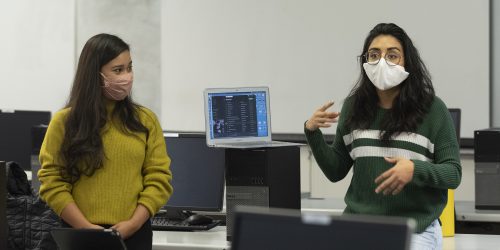
Raabe Garcia (right) leads a Pulse group. Photo credit: Lloyd Martinez
In past years, undergraduate students attended corporate chapel programs each Thursday. For fall 2020, however, “Pulse” was developed.
Pulse is a weekly meet-up for small groups of students which is intended to foster community and spiritual growth through intentional conversation, service projects and prayer. Student leaders follow a 12-week curriculum on the theme “Love is Life.”
“Pulse groups aim to facilitate an environment for students to engage with students/classmates they wouldn’t ordinarily talk to, engage in deep conversation about their faith and struggles, and help students realize their shared humanity despite their ethnic diversity,” says Danielle Pilgrim, associate chaplain. “Our hope is that students would experience a more profound sense of community on campus and a richer Andrews experience.”
Pulse group meetings often begin with a few icebreakers that help students become comfortable interacting with one another. Next, the student leaders recap their discussions from the previous week and remind students that their Pulse group is a safe space and judgment-free zone. “Pulse is about opening up spaces where students can hear each other and be heard by another,” says Raabe Garcia, senior, leader of an in-person Pulse group. “Pulse is not the place where we find solutions to problems. Which is great, because I don’t have all the answers. As a student leader leading a Pulse group, it’s less about giving a talk and more about leading others in a space where we can talk.”
The discussion portion of the group time centers around the concept of love — each week groups talk about a different aspect of love, whether it be loving yourself, God loving you, or loving Him back. Shelby Huse, junior and leader of a virtual Pulse group via Zoom, says, “I like to end with a challenge for the week to encourage the students to be thinking about what we as a group have talked about … these groups aren’t just meant to have a short-term effect. We want the ideas to follow students throughout their days and weeks, especially the idea of being loved unconditionally by God.”
Student Max Pierre joined a Pulse group because he wanted to meet and interact with new people despite the ongoing COVID-19 pandemic. He has greatly appreciated the different perspectives that arise as a result of the group conversations. He says, “As a junior at Andrews, I noticed that many students have circumvented social gatherings. Pulse helps bring a small group of students together who wouldn’t have done so otherwise. A sense of belonging comes with the open-minded atmosphere and lighthearted conversations.”
Raabe hopes that, in addition to gaining a sense of belonging, students act on what they’ve discussed. “If, at the end of Pulse, there will be a student who feels compelled to call their parents, talk to a stranger with kindness, notice their lonely roommate, or begin the journey of self-love, it would have been so worth the time.”
Moriah McDonald, University Communication student writer, and Gillian Panigot, media communications manager and FOCUS editor